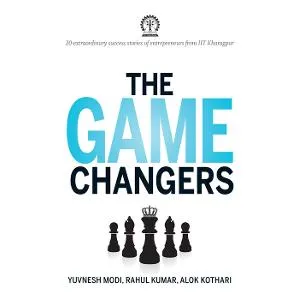[Book Review] The Game Changers: 20 Extraordinary Success Stories of Entrepreneurs from IIT Kharagpur
2011 Random House India (Flipkart)
263 pages; 20 chapters
Many IITians after graduation tend to head for MNC jobs and seven figure salaries – but several have chosen the different path of entrepreneurship. This

book traces the story of 20 such entrepreneurs from IIT Kharagpur. The introduction is written by Damodar Acharya, director, IIT Kharagpur, and the foreword by alum D. Subbarao, Governor, Reserve Bank of India. This book joins a range of others about entrepreneurs from Indian institutes (such as IIM-Ahmedabad).URLs of the featured companies would have been a welcome addition to the print book. The book does not mention that it has an online companion (a Google search reveals it), but the site is rather bland and could have done a much better job with connecting interested readers to the profiled companies or to the startup activities at IIT Kharagpur. The twitter account (@gamechangerbook) has also been idle for over a month.
What’s also missing in the book is an overall analysis or synthesis chapter about broader trends and implications from the 20 entrepreneur profiles. For instance, I noticed that many of the entrepreneurs have contributed to setting up tech centres of excellence in IIT Kharagpur: VLSI Lab, Centre for BioEnergy, School of Infrastructure Design and Management, School of Management, School of Intellectual Property Law, School of Telecommunications, and even a campus wide network for student Internet access.
It would have been informative to hear how these initiatives have performed, how they can be sustained, what their contributions have been to startups, how alumni are being encouraged to set up more such centres, and recommendations for other institutes to tap their alumni for such investments.
Still, the book does a good job of covering a range of entrepreneur profiles. The tech entrepreneurs span four generations of ICTs: mini-computers, PCs, Internet and mobiles.
Other sectors covered are social activism (Arvind Kejriwal: India Against Corruption – “be true to your morals, contribute to society”), shipbuilding (Vijay Kumar: Bharati Shipyard – “give each process a 100%”), gadgets for magicians (Sam Dalal: Funtime Innovations – “love what you do”), culture (Kiran Seth: SPIC MACAY – “music is for elevation not just entertainment,” “connect with the inner world not just outer world”), architectural design (Ranbir Singh Gupta: Sigma7 Design – “maintain your ethics and integrity”), construction management (Praful Kulkarni: gkkworks – “excel in all three areas: marketing, production, management), and agriculture (Venkata Subramaniam: eFarm – “don’t let investors run your business,” “don’t get bored or dejected”).
Profiles of more recent graduates include Krishan Mehra, co-founder and CTO of Capillary Technologies. After graduation, he worked at Microsoft Research in Bangalore, and then teamed up with classmates to launch his startup with funds from the Technology Incubation and Entrepreneurial Training Society (TIETS) of IIT Kharagpur, which also funds alumni.
Exposure to the Open Coffee Club for entrepreneurs in Bangalore introduced Mehra to Qualcomm Ventures, and his startup won the Qualcomm Q Prize Business Plan Competition. Today, the company’s offerings combine cloud, mobiles and CRM for retail solutions, for clients in India and overseas. Mehra’s success tips: focus on getting customers and learning from them; the first two years are the most important for getting traction.
I have summarised profiles of the other entrepreneurs and their success tips in Table 1 below.
Table 1: Profiles and Achievements of Entrepreneurs
Many of these entrepreneurs picked up organisational and networking skills during extra-curricular activities on campus, and were also exposed to a pan-Indian student base for the first time.
It would be fitting to end this review with some terrific quotes from the book:
“When you are at the top of the organisation, you quickly find out what a lonely place it is when it comes to making tough decisions.” (Suhas Patil)
“Do a PhD, as it is not easy to accomplish. Along the way, you will learn some vital lessons which will be helpful in your entrepreneurial life. It will teach you how to manage your emotions, disappointments and difficulties.” (Suhas Patil)
“India is a chaotic country. It provides an ideal environment for entrepreneurship because great ideas are churned out from chaos.” (Sridhar Mitta)
“Entrepreneurship has become an acceptable norm in India.” (Arjun Malhotra)
“Is it not wonderful that there is no end to learning and growing?” (Prabha Sinha)
“Ordinary people can do extraordinary things.” – Bikram Dasgupta
“The world is his who does his job with compassion.” (Tiruvalluvar)
Author profiles:
Yuvnesh Modi and Rahul Kumar are 4th year undergraduate students at IIT Kharagpur, pursuing an integrated master's in mathematics and computing; they were co-editors of THE ENTREPRENEUR, a quarterly newsletter dedicated to the field of entrepreneurship published in IIT Kharagpur. Alok Kothari is an alumnus of IIT Kharagpur. He graduated with an Integrated Master's in Mathematics and Computing in 2009. He was one of the founding members of Entrepreneurship Cell, IIT Kharagpur and one of the first editors of THE ENTREPRENEUR. He currently works as a project associate at a research organisation in Germany.
[Follow YourStory's research director Madanmohan Rao on Twitter at @madanrao]






